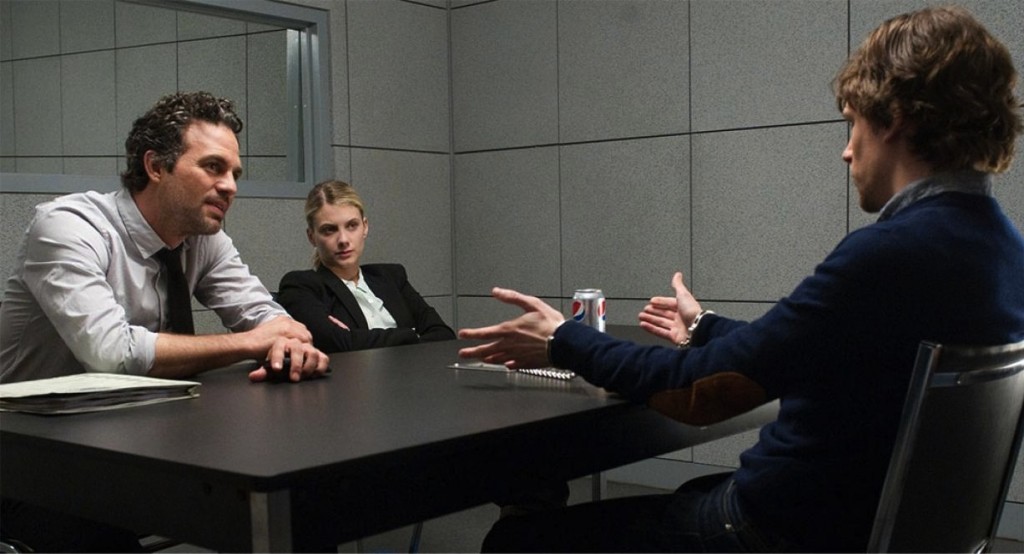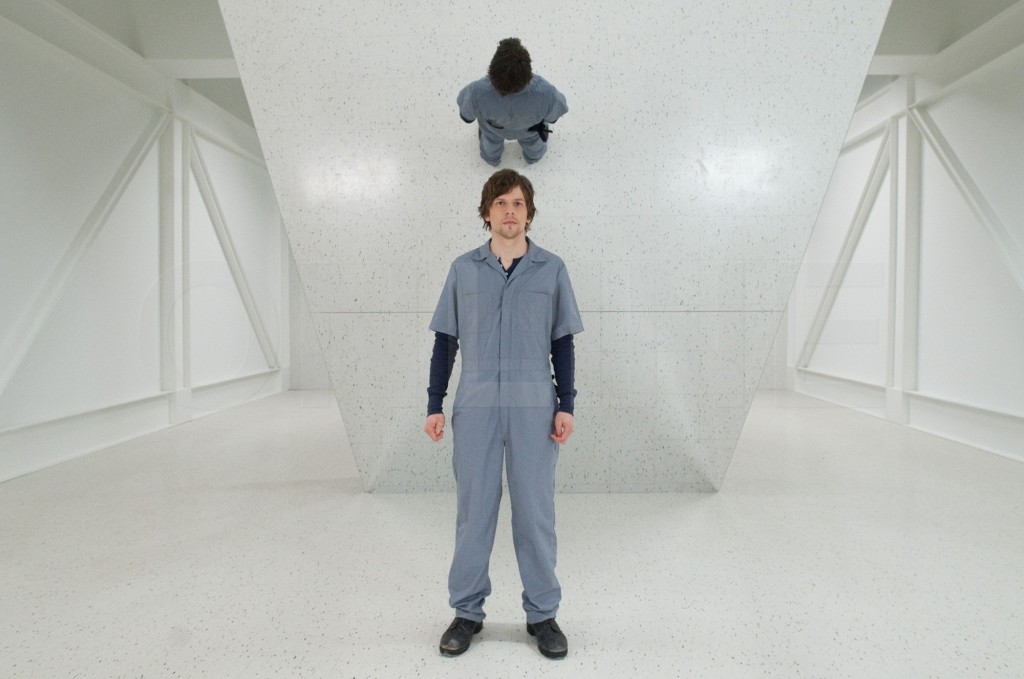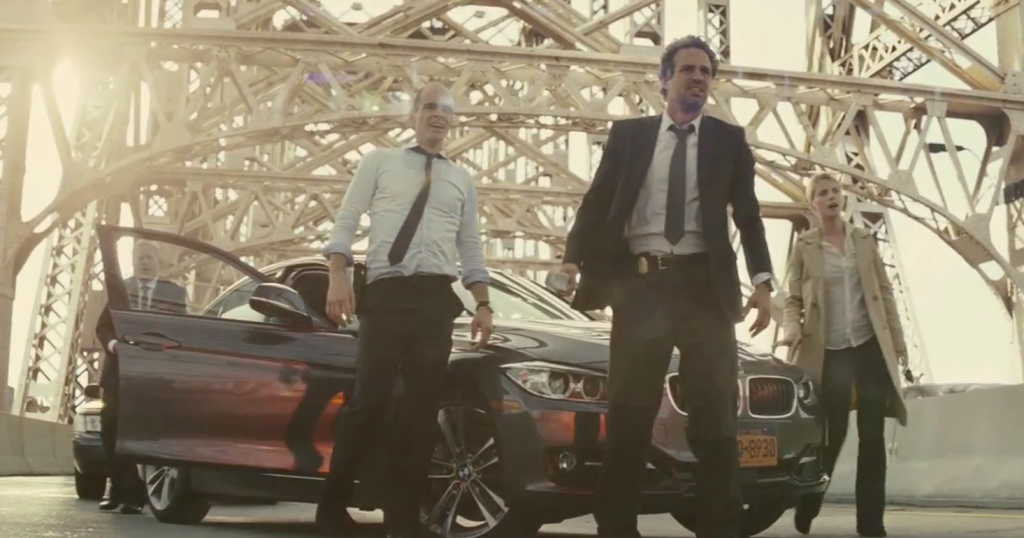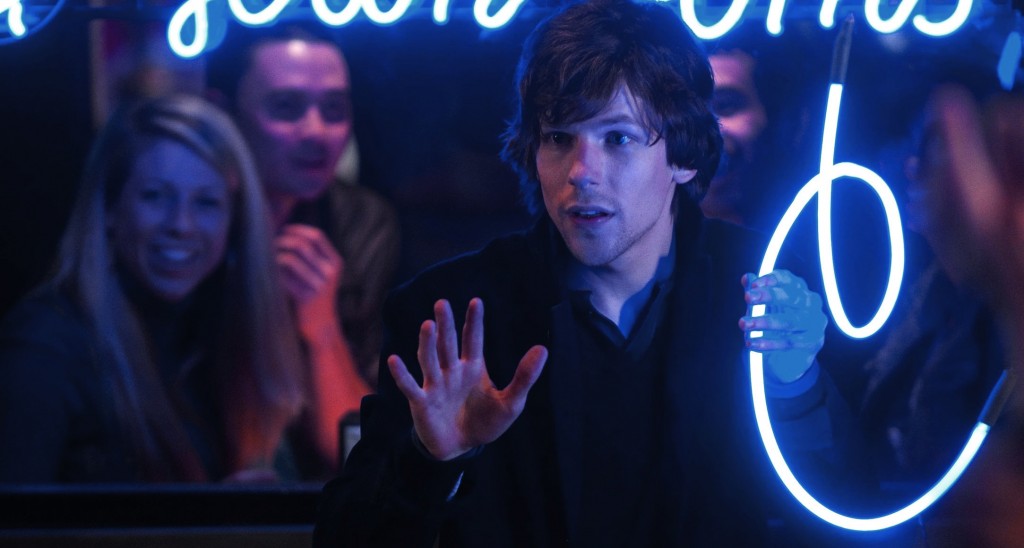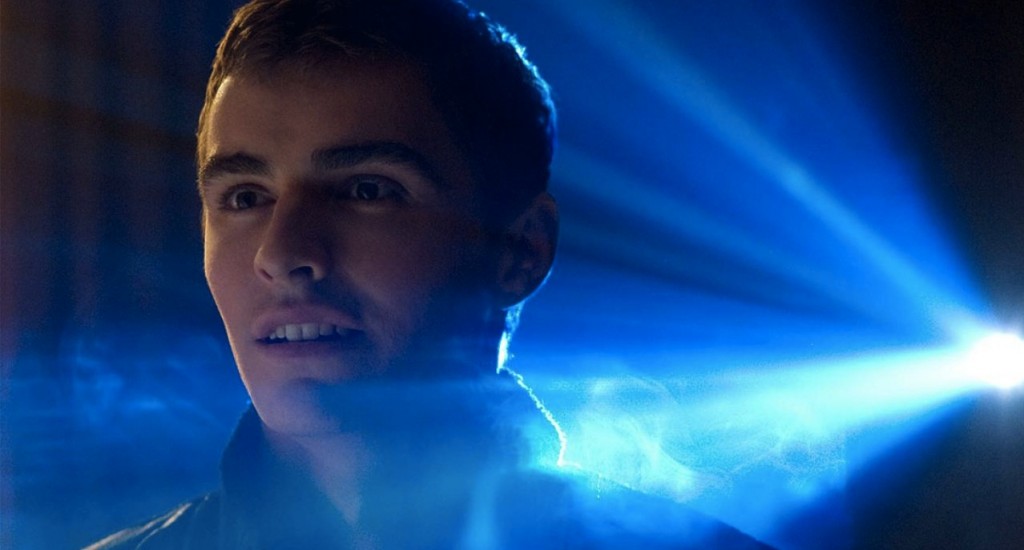NOW YOU SEE ME, Now I Review
“First rule of magic: always be the smartest person in the room.”
On my recent Australian whirlwind tour, I shared a pint with Ben McEachen, who has written for Empire magazine and works at a radio station in Sydney. I thought we’d add some flavour from down under to the Cinemagogue site, so here’s his take on Now You See Me. – James Harleman
Lying is wrong, right? Unless it has a rabbit, a hat and cheesy wand. Then, it’s magic. And magic isn’t lying. It’s ‘targeted deception’, as cocksure illusionist J. Daniel Atlas (Jesse Eisenberg) explains in the year’s surprisingest hit, Now You See Me. Hold the phones. Let’s get this straight. A professional at targeted deception is telling us that this is what he does? Correct.
Cue: Obvious questions. Should we believe him? What if we are the target? How can we trust him?
Amid the razzle dazzle of a shameless Summer crowd-getter, Now You See Me conjures an interesting and intricate web of belief systems. What it recognises – and messes with – is how belief is a human fundamental. Believe it or not, we all believe in things. Do you believe your computer is a computer, or a cat? Will the earth keep turning? Can a Scary Movie be funny?
But Now You See Me doesn’t explore the crucial factor, when it comes to what we believe in. The key thing is not what we believe in, but whether what we believe in is worthy of that belief. When we put our belief into action, that’s called faith. What’s the point of placing our faith in something, or someone, that we can’t trust to be faithful or trustworthy? You know, like having faith that J. Daniel Atlas will be honest – even though he has confessed to being deceptive.
Atlas is one of four ‘targeted deceivers’ briskly introduced through a opening sequence which casts each along the spectrum between grifter and showperson. The other three are ‘mentalist’ Meritt McKinney (Woody Harrelson, Eisenberg’s Zombieland cohort), sleight-of-hander Jack Wilder (Dave ‘brother of James’ Franco) and escapologist Henley Reeves (Isla Fisher).
Separately, they respond to an enigmatic invitation upon a tarot card. Identifying who is behind the card becomes one of Now You See Me‘s enduring puzzles. Their invite lures the four magicians to an instructive apartment which…. convinces them to become ‘The Four Horsemen’. Evidently, ‘Three Horsemen and One Horsewoman’ wasn’t as catchy. But The Four Horsemen sure is; jump-cut to ‘One Year Later’, and the quartet is commanding sell-out crowds on a Las Vegas stage. Ta-da.
The Four Horsemen? You’re right, The Four Horsemen are famous end-times figures from the Book of Revelation, chapter 6. There is no significant link between them and what the magicians go on to do. Unlike the Revelation posse, which seems to unleash Conquest, War, Famine and Death upon a wicked world – as part of God’s final judgment – these horse-play Horsemen saddle up to steal attention. And bank accounts.
Like the huge Vegas crowd it is performing to, Atlas invites us all to ‘Come in closer. The more you look, the less you see.’ Intriguing challenge, especially as the Horsemen’s plot-driving showstopper involves robbing a Paris bank – during their live Las Vegas performance. Ta-da.
Before you can cry ‘Siegfried and Roy!’, the Horsemen gazzump FBI questioning and are free to go (imagination abounds in Now You See Me, but logic can go MIA at convenient points). This helpfully allows them to press on with their next daring, and equally illegal, act.
Trying to be hot on their heels is FBI guy Dylan Rhodes (The Avengers‘ Mark Ruffalo, more amusingly frustrated than hulk-smash angry). Not only can Rhodes not take a trick, he’s also a sourpussed skeptic. Rhodes is unwilling to buy into the magic of magic – while steadily being outdone by the Horsemen’s ‘targeted deception’. For Rhodes, magicians prey upon the human desire to believe in something. They exploit this urge for their gain and others’ loss, Rhodes grumbles.
Not so, protests Alma Dray (Melanie Laurent), an Interpol offsider and probable love interest for Rhodes. After all, she is French, pretty and has a polite splash of sass. According to starry-eyed Dray, magic is about the wondrous potential which belief allows. Believing in something magical opens the door to embracing the impossible wonder of what might be conjured. If you don’t believe, well, you can hardly expect the magic to work its magic upon you.
Throughout the enjoyable nonsense of Now You See Me – contained spectacle and amiable antics are playfully wielded by director Louis Leterrier (making up for colossal dud Clash of the Titans) – the line between exploitation and wonderment is presented as being fixed. However, that’s difficult to believe, when the Horsemen’s magic can exploit even those who wonder at it.
“The closer you think you are, the less you’ll actually see.”
Their direct victims can be filed under ‘faceless wealth-hoarding machines’ (banks) or ‘semi-pompous British moneybags’ (rich guy). Even though the latter is played by screen champion Michael Caine, we’re meant to cheer when his bazillions are hocus-pocused….. because a noble reason is offered. Downplayed is how they exploit their British benefactor’s belief (he is bankrolling their USA tour. Big mistake). Upheld is how he’s asking for it, because his insurance company didn’t pay out when Hurricane Katrina demolished New Orleans.
Since the GFC, our real-world distrust of wealthy powerhouses has only increased. There’s no way financial enormity was built upon anything but bankruptcy of social conscience. Right? Such presumptions support Now You See Me’s celebration of its crooked conjurers as magical Robin Hoods. Like countless crime capers, from The Sting to Ocean’s 11, making out like a bandit is okay, provided there is a sense of justice to proceedings. And Average Joes and Janes aren’t affected.
Skylarking to a conclusion which is appropriately crazy and inspired, Now You See Me’s final scene still calls us to believe in the wonder, not worry about the exploitation. But how can we trust what is revealed, when we’ve spent two hours with a movie which delights in its targeted deception? Without becoming patronising, the routine appearances of Morgan Freeman – as a magic myth-buster, who intricately explains the Horsemen’s tricks – is an inventive layer of possible subterfuge. Should we believe his believable assessments, or look up his sleeve for hidden agendas?
What’s that? Oh, right. Now You See Me is just a movie about magicians. Let’s not take it too seriously. But what it tells us about belief has real-world implications. Imagine if The Four Horsemen were real. How could you trust these ‘heroes’, when their job is targeted deception? Would we be so entertained, if they turned their tricks upon us? And what would stop them from doing that? All along, they’ve told us what they do – and have demonstrated that even those who believe in them are at risk of exploitation, not magical wonderment.
McKinney: I’m just trying to create the space for wisdom.
Atlas: Okay, so you’re like Buddha, if he wasn’t so enlightened.
McKinney: And you’re like Jesus, if he was arrogant and all of his miracles were fake.
Makes you think about what we believe in, doesn’t it? How belief in action – faith – is likely to be disappointed or abused, if what we believe in isn’t worth it. Beyond cementing that we only can believe Atlas is a targeted deceiver of considerable proportions, the contrast with Jesus is far more meaningful than this witty insult intends.
As the gospel records demonstrate, plenty in 1st Century Israel thought Jesus to be a magician who did amazing tricks. An understandable assumption, as he did everything from turn water into wine (John 2: 1-11), restore sight to the blind (Matthew 20:29-34), and calm a wild storm (Mark 4:35-41). Wow. But Jesus didn’t claim to be a targeted deceiver. He didn’t suggest there is a fixed line between wonder and exploitation, which he proceeded to blur or break.
Instead, Jesus professed to be something far more shocking than a sophisticated illusionist. As his healing of a paralysed man demonstrates (Luke 5:17-26), Jesus’ signs, wonders and miracles support his mind-blowing affirmation that he is God’s own son, sent to save people from the awful consequences of their selfish ways.
No-one encountering Jesus should be left with any doubt that his displays of targeted truth were consistent and reliable. Climaxing in his unique and potent resurrection – coming back to life, three days after he was crucified, is a more notable spectacle than anything Now You See Me enacts – Jesus’ activities are verification that he isn’t a fake. By always doing what he says he will do, Jesus proves he has the astounding power and purpose he promised.
Trustworthiness is embodied by Jesus. The perfect person to put your faith in, then. Which is what his life and purpose was all about: ‘Jesus performed many other signs in the presence of His disciples that are not written in this book. But these are written so that you may believe Jesus is the Messiah, the Son of God, and by believing you may have life in His name (John 20:30-31).
As John’s gospel explains, the intention behind Jesus’ demonstrations is to provoke our belief. Which is somewhat strange, given that genuine belief in Jesus should be automatic, due to how trustworthy, faithful and truthful he proved himself to be.
The real challenge, then, is making yourself believe that not believing in Jesus is a belief worth holding.
– Ben McEachen
What did you think of Ben’s review? Of the movie? I only disagree with his assessment of Clash of the Titans. Share your thoughts! – James Harleman


